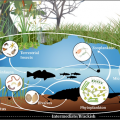Erin Kiskaddon is a member of the Coastal Ecology Department at The Water Institute and specializes in a diverse array of topics related to coastal ecology, with specific emphasis in benthic invertebrates; data collection, analysis, and interpretation; technical writing; and project management. Erin received her bachelor’s at Whitman College with a concentration in Biology and then graduated from the University of South Florida Tampa with a master’s Degree in Biology. Her thesis work focused on trophic ecology of invertebrates in coastal mangrove transition zones. At the Dauphin Island Sea Lab, she studied marine benthic infauna communities and the geophysical properties of marine sediments around Dauphin Island, AL.

Projects
- Louisiana Climate Action Plan
- Mobile, Ala. Resilience Assessment and Plan
- Advancing Offset-Enabling Technology for Blue Carbon Sequestration
- Lower Trophic Level Inventory
- Southeast Conservation Adaptation Strategy (SECAS)
- Quantifying Blue Carbon in Coastal Louisiana Wetlands for Potential Accreditation
Reports
- A Community-Informed Framework for Quantifying Risk and Resilience in Southeast Louisiana
- Mechanics of the Southeast Conservation Blueprint
- Advancement of the Southeast Conservation Adaptation Strategy (SECAS) for Project-Scale Planning: Chandeleur Islands (Breton National Wildlife Refuge) Restoration
- Application of the SECAS Gulf-wide Data Suite in Restoration Planning
- LA TIG Monitoring and Adaptive Management Strategy
- Consequence Analysis of the Draft Portfolio of Climate Strategies and Actions
- Consequence Analysis of a Hypothetical Portfolio of Climate Strategies
- Improving SECAS Gulf-wide Integration
- Southeast Conservation Blueprint Mechanics
- Guidance for Coastal Ecosystem Restoration and Monitoring to Create or Improve Bird-Nesting Habitat
Publications
- Supporting habitat restoration in the northern Gulf of Mexico through synthesis of data on multiple and interacting benefits and stressors
- Oil disturbance reduces infaunal family richness but does not affect phylogenetic diversity
- Quantifying the Potential Contribution of Submerged Aquatic Vegetation to Coastal Carbon Capture in a Delta System from Field and Landsat 8/9-Operational Land Imager (OLI) Data with Deep Convolutional Neural Network
- Tradeoffs in habitat value to maximize natural resource benefits from coastal restoration in a rapidly eroding wetland: is monitoring land area sufficient?
- Effects of sample gear on estuarine nekton assemblage assessments and food web model simulations
- Shallow infaunal responses to the Deepwater Horizon event: implications for studying future oil spills
- Impacts of infauna, worm tubes, and shell hash on sediment acoustic variability and deviation from the viscous grain shearing model
- The Weird and Wonderful World of Worms
- Evaluation of emission reduction and other societal and environmental outcomes: Structured decision making for the Louisiana climate action plan
- Quantifying the Potential Contribution of Submerged Aquatic Vegetation to Coastal Carbon Capture in a Delta System from Field and Landsat 8/9-Operational Land Imager (OLI) Data with Deep Convolutional Neural Network
- Identifying and filling critical knowledge gaps can optimize financial viability of blue carbon projects in tidal wetlands
See All Work
